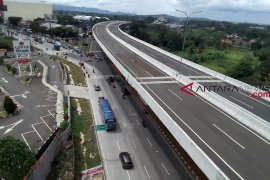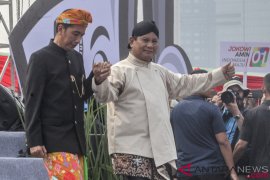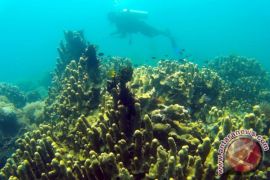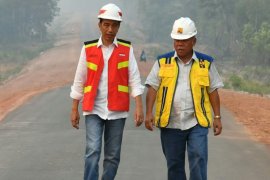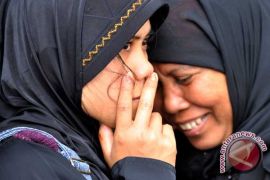When delivering his State Address before a joint session of the Indonesian House of Representatives (DPR) and the Regional Representative Council (DPD) at the Parliament Building here Wednesday (August 16), President Susilo Bambang Yudhoyono described the MP3EI as a strategic breakthrough.
"Moreover, the MP3EI is actually a product arising from the cooperation and partnership amongst the central government, the regional governments, state-owned enterprises, the private sector and the academia," president said.
The government is accelerating and expanding development in six economic corridors in the country to stimulate the emergence of economic centers in each corridor.
The MP3EI`s six economic corridors are the Corridor of Sumatra, Kalimantan, Java, Sulawesi, Bali and Nusa Tenggara, and the Corridor of Papula-Maluku.
Sumatra will be designated as a center for agriculture and energy; Java for industries and services; Kalimantan for mining and energy; Sulawesi and North Maluku for agriculture and fisheries. Meanwhile, Bali and East and West Nusa Tenggara will focus on tourism and supporting national food self-sufficiency; and Papua and Maluku on natural and human resources.
In total, the projects will cost an estimated Rp3,000 trillion until 2014. The investment is expected to come from state-owned companies, national private companies, government funds and foreign direct investment.
"In a time span of 15 years ahead, we are gradually developing industrial clusters, be it to improve connectivity between upstream and downstream industries, as well as connectivity between growth centers an their buffer areas," he said.
Being a strategic breakthrough, the MP3EI also constitutes an answer to the development disparity that for a long time has become a trap hindering the realization of equitable distribution of development throughout the country.
"We shall build leading industries in various areas that would strengthen the domestic economic structure. We are offering precise incentives to business-circles and we are improving the investment climate in the regions," the president said.
Following the President`s State Address on the occasion of Indonesia`s Independence Day which falls on August 17, National Development Planning Minister/Head of the National Development Planning Agency (Bappenas) Armida Alisjahbana said the government would prioritize the implementation of MP3EI projects in 2012.
The projects would include construction of Bakauheni Pier VI in Lampung (Sumatra), construction of Merak breakwater harbor, Banten Province (Java), Jatigede dam in West Java, and Semarang Tawang-Gambringan-Surabaya double track railway construction in Central Java.
She explained that the government would also focus on its 2012 initiatives to accelerate development in three regions, namely Papua, West Papua and East Nusa Tenggara by allocating funds amounting to Rp18.16 trillion. Papua will get Rp8.1 trillion, West Papua Rp3.5 trillion, and East Nusa Tenggara Rp6.6 trillion.
The funds would be spent for projects on food resilience, education services, people`s economic development, poverty eradication, health services and projects which are pro indigenous people.
President Yudhoyono in his address on the 2012 Draft State Budget and Financial Notes at the Parliament Building here on August 16, revealed that the state expenditures were set at Rp1,418.5 trillion, up 97.7 trillion or 7.4 percent from the 2011 revised state budget which was set at 1,320.8 trillion. Infrastructure projects will get a big share of the state expenditures.
On August 8, Chief economic minister Hatta Rajasa said capital spending in 2012 would be more expansive in connection with the implementation of the MP3EI projects.
The portion for infrastructure and projects relating to the MP3EI would be bigger and more expansive, the minister explained.
To facilitate a smooth implementation of the MP3EI projects, President Yudhoyono has asked for the revision of regulations hindering the government program.
The head of state issued nine instructions linked to the implementation of MP3EI, including on revising all regulations that hamper the implementation of MP3EI.
"If the regulations are in the form of laws the government would certainly take an initiative to discuss them with the House of Representatives. It must be assured that no obstacle hinders the implementation of the MP3Ei or projects relating to it," Minister Hatta Rajasa said at the State Secretariat after a coordination meeting last July.
The president also asked for harmonization of central and regional relations so that no conflict would occur that could hinder the work of the committee that implements the MP3EI.
In the meeting that was also attended by the National Economic Committee (KEN), the National Innovation Committee (KIN) and the Indonesian Chamber of Commerce and Industry (KADIN), Hatta said, the head of state also expressed his commitment to issuing a government regulation in case the discussion on the bill on land acquisition for public interests dragged on and did not finish by the end of 2011.
"With regard to the land acquisition issue we must invite the House of Representatives to jointly discuss the bill because it is very important and has been waited for a long time," he said.
Since its launching on May 27, 2011, some 39 projects have been officially started worth Rp400 trillion. From July 2011 to 2012, Hatta said there would be 136 projects included in the MP3EI worth around Rp1,000 trillion.
The MP3EI program has also attracted foreign investors, such as China, which is reportedly in the process of forming a working group to follow up on the MP3EI,
The working group would be formed after the two countries held a follow up meeting in the second half of 2011, Minister Hatta said recently after visiting China.
The Chinese working group would later team up with their Indonesian counterpart to develop a number of infrastructure projects, he said.
(T.F001/HAJM)
Reporter: by Fardah
Editor: Ruslan Burhani
Copyright © ANTARA 2011
